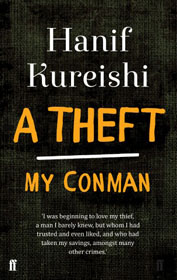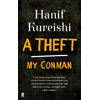This article is more than 1 year old
Guy Kawasaki's guide to social media, Hanif Kureishi's cash crash catharsis and more
Tweeting for n00bs plus fraudsters and fakes
A Theft: My Conman
Hanif Kureishi is the author of many books and screenplays, the most famous of which are My Beautiful Launderette and The Buddha of Suburbia. Two years ago, Kureishi was swindled out of his life savings by a partner at an accountancy firm.
A Theft: My Conman is the tale of how this came to pass. It opens: “I met a man who fed a worm into my ear, where it became comfortable and began to devour my brain” – a great first line reminiscent of Kafka’s The Metamorphosis or Dostoevsky’s Notes from the Underground. However, the prose soon settles down to a less exalted and more mundane style.
Kureishi describes himself as: “A good bourgeois bohemian”.
Jeff Chandler, the conman, operates a Ponzi scheme into which the narrator is drawn: “I learned that the insane, these days, might disguise themselves as money experts.”

There are a few quotes from eminent quotees such as Nietzsche, Freud and Garcia-Marquez. There is no shortage of literary observation: “Most proper writers would rather be at the Genet end of the scale with the criminals, thieves and Bedlam boys.”
Jean Genet would have made Jeff Chandler sexy, however, Kureishi’s conman is just a banal, glorious fuckup, though the author does equate being a victim with an unrequited love affair: “I would beg him for a new lie and he would give me one...” and: “I wanted to know him, but he did not want to know himself.”
“Jeff was ultimately a self deceiver, a seducer who had seduced himself.” Kureishi falls under Chandler’s spell and is taken along for an incredibly long time. His disillusion, when it eventually arrives, is more general than personal.
Chandler seems like “[t]he money world’s most representative figure. A lunatic at the centre of a corrupt, collapsing system”.
A Theft: My Conman is a strange work. As a personal catharsis, it is effective, as a piece of literature, less so. Kureishi is decidedly sketchy about his thoughts and motivations during the initial stages of the fraud, he says: “Freud wrote that love involves the undervaluation of reality and the overvaluation of the desired object.”
But Kureishi is rather ambivalent as to what his desires actually were, he comes over as a rather world weary gambler. As regards his thief, he quotes La Boetie: “Freedom is the one thing which men have no desire for”, needless to say the thief doesn’t get what he does not desire.
The story ends with the disclaimer: “As an artist you have to force yourself to turn and look at the world, and the world is always worse and more interesting than you can imagine or render.”
A Theft: My Conman reads like an outline for a novel, but as a true life tale it sits uneasily between a cathartic exercise and trash magazine confession. As a longer piece in a short story collection, it might be overlooked as a rather average example, but as a standalone piece this slim volume is unimpressive and one strictly for Hanif Kureishi devotees. MD
 Author Hanif Kureishi
Author Hanif Kureishi
Title A Theft: My Conman
Publisher Faber and Faber
Price £4.99 (Paperback), £1.99 (eBook)
More info Publication website
